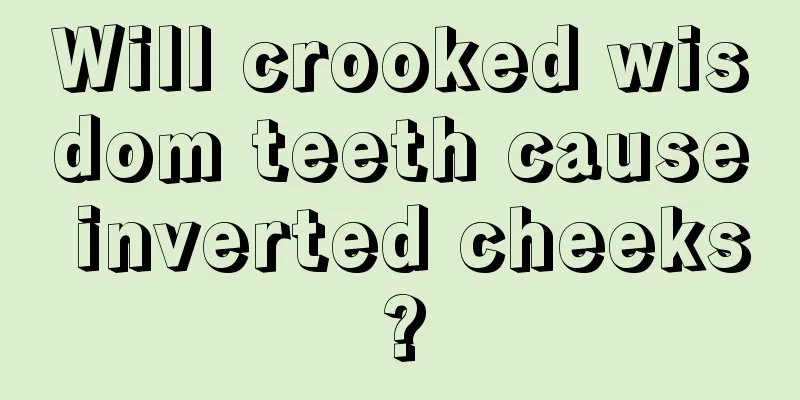Will crooked wisdom teeth cause inverted cheeks?

|
Wisdom teeth are a special type of tooth that grows in many people's lives. The growth of this type of tooth has almost no benefit to the human body, and if wisdom teeth grow in the wrong direction, it may have an extremely adverse effect on people's health. So, if wisdom teeth grow crooked, it will be very detrimental to the health of other teeth. Do crooked wisdom teeth have to be removed? If we don't remove it, will it affect our cheeks? Let’s take a closer look below. 1. What is the reason for wisdom teeth to grow crooked?Wisdom teeth grow at the end of the alveolar bone. Due to the increasingly refined eating habits of modern humans, the alveolar bone will degenerate to varying degrees in length, width, and strength, which makes it impossible to provide sufficient space for the eruption of wisdom teeth. Therefore, when wisdom teeth erupt, they often cause ectopic eruption, impaction, etc. due to lack of space. Therefore, most people's wisdom teeth grow crookedly or cannot grow out completely. 2. Do I have to remove my wisdom teeth if they grow crooked? It is recommended to unplug it. Wisdom teeth are the remnants of human tooth evolution, and they often erupt in insufficient numbers, erupt asymmetrically, or erupt ectopically and grow crookedly. These abnormal eruptions often increase the difficulty of cleaning, manifesting as pericoronitis of wisdom teeth, caries of wisdom teeth or adjacent teeth, periodontitis, pulpitis and other diseases, causing severe pain. Therefore, if you find that your wisdom teeth are growing crooked, it is recommended to remove them as soon as possible. 3. Things to know about the harm of wisdom teeth 1. Misplaced wisdom teeth are prone to tooth decay Impacted or misplaced wisdom teeth can easily cause food debris to become stuck between the second molars and wisdom teeth and in the periodontal gaps, which are difficult to remove and often lead to tooth decay. According to the survey, the average caries prevalence rate at the cervical area of the mandibular second molars is 16.4%. The caries prevalence rate varies significantly at different age stages, ranging from only 3.7% at the age of 20 to as high as 27% at the age of 50. It can be seen that removing impacted or misplaced wisdom teeth is the key to preventing caries of second molars, and it may also prevent the development of shallow caries that have already occurred. 2. Wisdom teeth are prone to produce tooth-destroying cells During the development of the tooth germ of the mandibular wisdom tooth, the long axis of the tooth is originally tilted forward. It only gradually erupts upright when the mandible is sufficiently developed. When the eruption process is blocked by the second molar, odontoblasts attached to the root surface of the second molar are produced there. Odontolytic cells can release proteases that cause gradual absorption of the tooth roots. In severe cases, the distal root of the mandibular second molar can be completely absorbed. Moreover, chronic periodontitis that often exists between impacted wisdom teeth and second molars can also cause inflammatory absorption of alveolar bone. 3. Wisdom teeth can easily cause craniomandibular disorders The impaction or dislocation of mandibular wisdom teeth often causes occlusal interference with the maxillary second molars and leads to pathological retraction of the mandible, which is one of the causes of craniomandibular disorders. The main clinical manifestations are clicking, pain and abnormal mandibular movement in the temporomandibular joint, pain in the masticatory muscles, tinnitus, tongue pain and other symptoms. Many patients have achieved significant therapeutic effects after removing impacted or misplaced wisdom teeth due to blocking the potential factors that induce craniomandibular disorders. 4. Cystic lesions around wisdom teeth Odontogenic cystic lesions of the jaw are prone to occur in unerupted impacted teeth, and the chance of eruption of mandibular wisdom teeth is highest, which is obviously the main site of occurrence. When the cyst develops to a certain extent, the jaw may swell and deform, and in case of secondary infection, swelling and pain will recur. In severe cases, pathological fractures may occur. 5. Wisdom teeth can easily cause oral mucosal cancer The gums and buccal mucosa of impacted and misplaced wisdom teeth may suffer pathological damage such as ulcers, erosions, abnormal tissue proliferation and white spots due to long-term mechanical stimulation of the crown edge or repeated biting. Such a long-term trauma repair and re-trauma process will affect the normal keratinization of the oral mucosal epithelium and cause precancerous lesions, which in turn induce oral mucosal carcinogenesis. |
<<: What are the reasons for acne on girls' cheeks
>>: What skin type is it with dry cheeks and oily T-zone?
Recommend
Experts explain the symptoms of renal cancer brain metastasis
In the late stage, kidney cancer patients will ha...
Will the growth of renal hamartoma cause lower back pain?
The standard name of renal hamartoma is angiomyol...
What is esophageal tumor?
Suffering from esophageal tumor will definitely a...
Does painless hematuria mean bladder cancer?
Hematuria is not necessarily a bladder tumor, but...
How to tighten the skin after losing weight? Three tips to help you solve it easily
Love of beauty is a woman's nature, and every...
What should I do if I have skin allergies? Causes and treatments of skin allergies
In daily life, there are a lot of common sense th...
What is the cause of arterial embolism?
As we all know, arterial embolism is very harmful...
How to make your own aloe vera gel
We all know that aloe vera gel has a good beauty ...
How should we nourish our stomach?
The accumulation of factors such as irregular die...
Is Helicobacter pylori negative normal?
The test results of Helicobacter pylori are divid...
What vegetables to eat to prevent lung cancer
There are many ways to prevent lung cancer. In ad...
Immunoglobulin A
The human body needs many elements, and it is nec...
Is it okay to use honey to wash your face?
Honey is a food that we easily come into contact ...
Lean your legs against the wall at 90 degrees
Some women who want to lose weight like to put th...
What are the dietary methods for ovarian tumors
When ovarian tumors occur, many women actively se...









